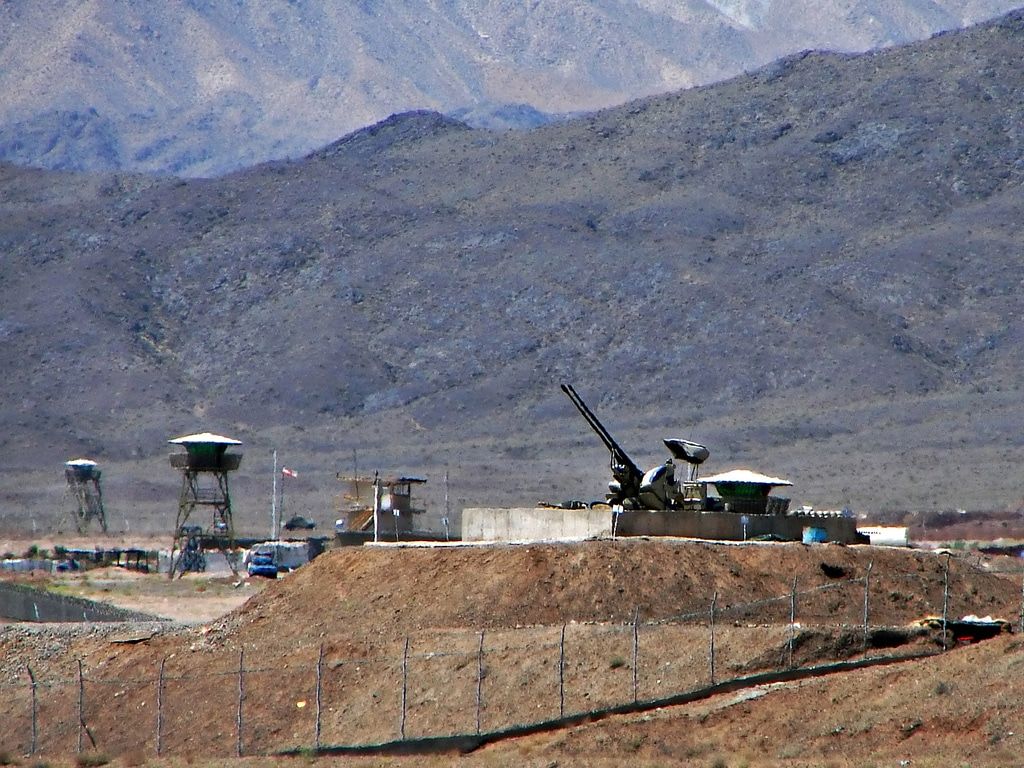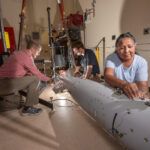Alleged sabotage at Iran’s Natanz nuclear facility comes amid talks on reviving the Iran nuclear deal
By Susan D’Agostino | April 12, 2021
 Anti-aircraft guns guarding Natanz nuclear facility. Credit: Hamed Saber. Image accessed via Wikimedia Commons. CC BY 2.0.
Anti-aircraft guns guarding Natanz nuclear facility. Credit: Hamed Saber. Image accessed via Wikimedia Commons. CC BY 2.0.
Iran’s Natanz underground uranium enrichment site—a key nuclear facility for the country—went dark on Sunday in what Iranian officials called an act of “nuclear terrorism” carried out by Israel. While Israel did not confirm or deny responsibility, Israeli and American intelligence officials have indicated that Israel’s Mossad spy agency played a role—a message that has been reported widely in Israeli media.
Iranian Foreign Minister Mohammad Javad Zarif vowed that Iran “will take revenge for this action against the Zionists,” according to the state-run Iranian news agency. The blackout was the result of an apparent physical attack on the power system that supplies the nuclear facility’s centrifuges, which could delay enrichment work there by months. On Monday, Salehi made clear that Natanz had emergency power to continue enrichment activities.
The Natanz power outage brings a shadow conflict between Iran and Israel into sharper focus. It also threatens to derail renewed efforts by Iran and the United States to revive talks on the Iran nuclear deal. Former US president Donald Trump exited the deal three years ago, and since then, Iran has inched away from full compliance with the agreement in a series of steps that aimed to pressure the United States to return to it. The Biden administration and Iran began indirect nuclear deal talks in Vienna last week and are scheduled to talk with other parties this week. The alleged attack will further strain US-Israeli relations. Biden has supported a US reentry to the nuclear pact; Israeli Prime Minister Benjamin Netanyahu has strongly discouraged such a move, noting that, “(s)uch deals with extreme regimes are worthless.”
“We should expect posturing and rhetoric from Iran in response to the attack. And Iran is likely to air its concerns and outrage during the negotiations,” said Kelsey Davenport, director for nonproliferation policy at the Arms Control Association, “but hopefully both sides will stay on track and recognize that the end goal—restoration of the nuclear deal—benefits their national interests.”
This is not the first time the Natanz nuclear facility has been targeted. Last July, a mysterious fire—also a presumed act of sabotage—damaged the site’s highly guarded centrifuge facility. In 2010, against the backdrop of global concerns about Iran’s nuclear program, the Stuxnet computer virus, which was widely attributed to the United States and Israel, destroyed some of Natanz’s centrifuges. In a similar vein, Iranian nuclear scientists have been targets of assassinations, for which Iran has also blamed Israel. The prominent Iranian nuclear scientist Mohsen Fakhrizadeh, for example, was assassinated in 2020.
“Strikes, sabotage, assassinations—all of these activities only temporarily set back Iran’s nuclear program and increase the risk that Tehran will decide in the long term that it’s better off with nuclear weapons,” said Davenport. “These acts of sabotage are reckless and risk instigating a crisis.”
The White House has made clear it was “not involved in any manner” in the alleged sabotage, but has yet to condemn the attacks. In the event that US efforts to rejoin the Iran nuclear deal were a secondary target of the Natanz power outage, such a statement could be meaningful.
Together, we make the world safer.
The Bulletin elevates expert voices above the noise. But as an independent nonprofit organization, our operations depend on the support of readers like you. Help us continue to deliver quality journalism that holds leaders accountable. Your support of our work at any level is important. In return, we promise our coverage will be understandable, influential, vigilant, solution-oriented, and fair-minded. Together we can make a difference.
Keywords: Iran, Iran nuclear deal, Iranian nuclear program, Israel, United States, nuclear targets
Topics: Nuclear Energy, Nuclear Risk, Nuclear Weapons
















So assassinating scientists and attacking an operational nuclear facility under IAEA supervision is simply called ‘sabotage’ rather than what it actually is, international nuclear terrorism. These are the Western ‘standards’ when it comes to Israel. Why do they hate us, indeed.
The Administration will continue to push hard for a renewed peace deal and push hard for disarmament, notwithstanding the opposition of the far right in the US Foreign Policy Establishment, which as usual is fomenting regional destabilization and conflict, because driving the entire region into another 20 years of untold misery is not in the Administration’s best interests.